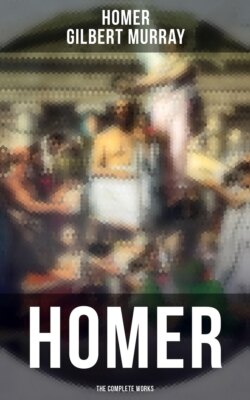HOMER: The Complete Works

Реклама. ООО «ЛитРес», ИНН: 7719571260.
Оглавление
Homer. HOMER: The Complete Works
HOMER: The Complete Works
Table of Contents
Introduction
Homer
INTRODUCTORY
THE LEGENDARY POETS
THE HOMERIC POEMS
ILIAD AND ODYSSEY: THE PANATHENAIC RECITATION
THE EPIC LANGUAGE
THE SUBJECT-MATTER OF HOMER
CRITERIA OF AGE
About Homeric Hymns
Iliad
BOOK I
BOOK II
BOOK III
BOOK IV
BOOK V
BOOK VI
BOOK VII
BOOK VIII
BOOK IX
BOOK X
BOOK XI
BOOK XII
BOOK XIII
BOOK XIV
BOOK XV
BOOK XVI
BOOK XVII
BOOK XVIII
BOOK XIX
BOOK XX
BOOK XXI
BOOK XXII
BOOK XXIII
BOOK XXIV
Odyssey
BOOK I
BOOK II
BOOK III
BOOK IV
BOOK V
BOOK VI
BOOK VII
BOOK VIII
BOOK IX
BOOK X
BOOK XI
BOOK XII
BOOK XIII
BOOK XIV
BOOK XV
BOOK XVI
BOOK XVII
BOOK XVIII
BOOK XIX
BOOK XX
BOOK XXI
BOOK XXII
BOOK XXIII
BOOK XXIV
Homeric Hymns
HYMN TO APOLLO
THE FOUNDING OF DELPHI
II. HERMES
III. APHRODITE
IV. HYMN TO DEMETER
V. TO APHRODITÉ
VI. TO DIONYSUS
VII. TO ARES
VIII. TO ARTEMIS
IX. TO APHRODITE
X. TO ATHENE
XI. TO HERA
XII. TO DEMETER
XIII. TO THE MOTHER OF THE GODS
XIV. TO HERACLES THE LION-HEART
XV. TO ASCLEPIUS
XVI. TO THE DIOSCOURI
XVII. TO HERMES
XVIII. TO PAN
XIX. TO HEPHÆSTUS
XX. TO APOLLO
XXI. TO POSEIDON
XXII. TO HIGHEST ZEUS
XXIII. TO HESTIA
XXIV. TO THE MUSES AND APOLLO
XXV. TO DIONYSUS
XXVI. TO ARTEMIS
XXVII. TO ATHENE
XXVIII. TO HESTIA
XXIX. TO EARTH, THE MOTHER OF ALL
XXX. TO HELIOS
XXXI. TO THE MOON
XXXII. TO THE DIOSCOURI
XXXIII. TO DIONYSUS
FOOTNOTES
Отрывок из книги
Homer, Gilbert Murray
Published by
.....
There are many exceptions to these rules. Dr. Fick of Göttingen, who has translated all the 'older parts' of Homer back to a supposed original Æolic, leaving what will not transcribe as either late or spurious, has found himself obliged to be inconsistent in his method; when Fιδέσθαι occurs without a F he sometimes counts it as evidence of lateness, sometimes alters it into íκέσΘαι. In the same way a contraction like νικωντεσ may represent an Æolic νíκανς from νίκαμὶ, or may be a staring Atticism. When we see further that, besides the Ionisms which refuse to move, there are numbers of Æolisms which need never have been kept for any reason of metre, the conclusion is that the Ionising of the poems is not the result of a deliberate act on the part of a particular Ionic bard -- Fick gives it boldly to Kynæthus of Chios -- but part of that gradual semi-conscious modernising and re-forming to which all saga-poetry is subject. The same process can be traced in the various dialectic versions of the Nibelungenlied and the Chanson de Roland. A good instance of it occurs in the English ballad of Sir Degrevant, where the hero 'Agravain' has not only had a D put before his name, but sometimes rhymes with 'retenaunce' or 'chaunce' and sometimes with 'recreaunt' or 'avaunt.' It comes from an AngloNorman original, in which the Sieur d'Agrivauns formed his accusative d'Agrivaunt.14
The evidence of language is incomplete without some consideration of the matter of the poems. What nationality, for instance, would naturally be interested in the subject of the Iliad? The scene is in the Troad, on Æolic ground. The hero is Achilles, from Æolic Thessaly. The chief king is Agamemnon, ancestor of the kings of Æolic Kymê. Other heroes come from Northern and Central Greece, from Crete and from Lycia. The Ionians are represented only by Nestor, a hero of the second rank, who is not necessary to the plot.
.....